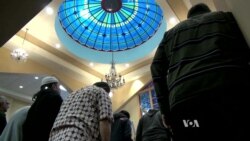Although the numbers of Muslim Americans are comparatively small — just under one percent of the adult population — political analysts say Muslim voters can make a difference in this year's presidential election in states with closely divided electorates such as Florida, Ohio, Virginia and Pennsylvania.
At the Islamic Society of Orange County, the largest mosque in Southern California, a volunteer urges those U.S. citizens who have come for Friday prayer to register as voters.
Fareed Farukhi, an accountant and chairman of the Islamic Society of Orange County, is concerned about many issues, from improving education to global warming.
Asad Shafiq, a business professor, worries about racial disparities and income inequality, “and how that gap has grown in the last 40 or 50 years. And what should we, as American people, do about it?”
Overshadowing those issues, these Muslim voters say they feel they have become targets in the campaign.
Tired of fear-mongering
Ahmed Soboh was guest speaker at the mosque on a recent Friday, and he said American Muslims are politically diverse, but agree on one thing: that they are “tired of the rhetoric and fear-mongering and Islamophobic comments that are being repeated by many of the candidates.”
“It's affecting our lives on a personal level,” he said. “At work, at school, when we're walking in the mall, when we're walking in the street, people are giving us that look.”
Soboh, a local dentist and the religious director of a neighboring mosque, says he is talking about Republican candidates Donald Trump and Ben Carson.
Trump, the frontrunner among Republican contenders, has said that in light of terrorist acts, all Muslims should be temporarily barred from entering the country. Carson has said that Islam is incompatible with American politics.
At the school connected to this mosque, the Orange Crescent School, the children receive civics lessons. Vice Principal Leila Dakelbab says the students represent 32 different countries.
“The only thing they all have in common is that they are Muslim, but we all share the same beliefs in democracy and liberty and freedom for all its peoples and citizens,” she said.
Getting out the vote
At another Islamic school in an African American neighborhood of Los Angeles, called the Islah Academy, students recite Arabic and also get lessons in civic engagement. They learn “character building and leadership traits,” explains principal Azizah Ali-Regan.
Nearly two-thirds of American Muslims are immigrants. “We are citizens by choice,” explains Jordanian immigrant Haitham Bundakji, a real estate investor. “We accepted and wanted to be here and serve this community because this country is a great country,” he explained. “It opened its gates for us.”
Muslims are also an influential minority among African Americans, and near central Los Angeles, community activist Umar Hakim also worries about Donald Trump. Hakim says despite being native born, Muslims in his community feel the sting of prejudice.
“So this year, we're really going to be focused on getting out the vote and raising our percentage of registered voters in America, so we can show the power of our voice,” he said.
Farukhi, who was born in India, wants to hear from candidates who are inclusive.
“We are all people of God, one humanity, one family,” he said. “So to say somebody's different, put them outside this country, doesn't quite fit well” with American ideals.
Influential in swing states
Political analyst Dan Schnur of the University of Southern California says that while some American voters share a suspicion of Muslims, the best American leaders are those who “articulate the strong stance and a smart plan to restrain terrorist activity while still making it clear that that the overwhelming majority of Muslims, both in the United States and elsewhere, are in fact peaceful people who hold no support for the terrorists.”
He says it is becoming more difficult to find those leaders.
More than than 85 percent of Muslim voters voted for Democrat Barack Obama in the last presidential election, according to a 2012 survey by the Council on American Islamic Relations.
Dan Schnur says the small size of the Muslim electorate limits its impact to a handful of swing states, but Muslim voters can make a difference there in a close election. He adds that attracting minority voters should be a part of any winning political strategy.
The Pew Research Center projects that by 2050, Muslims will outnumber Jewish Americans, reaching just more than two percent of the population.


























